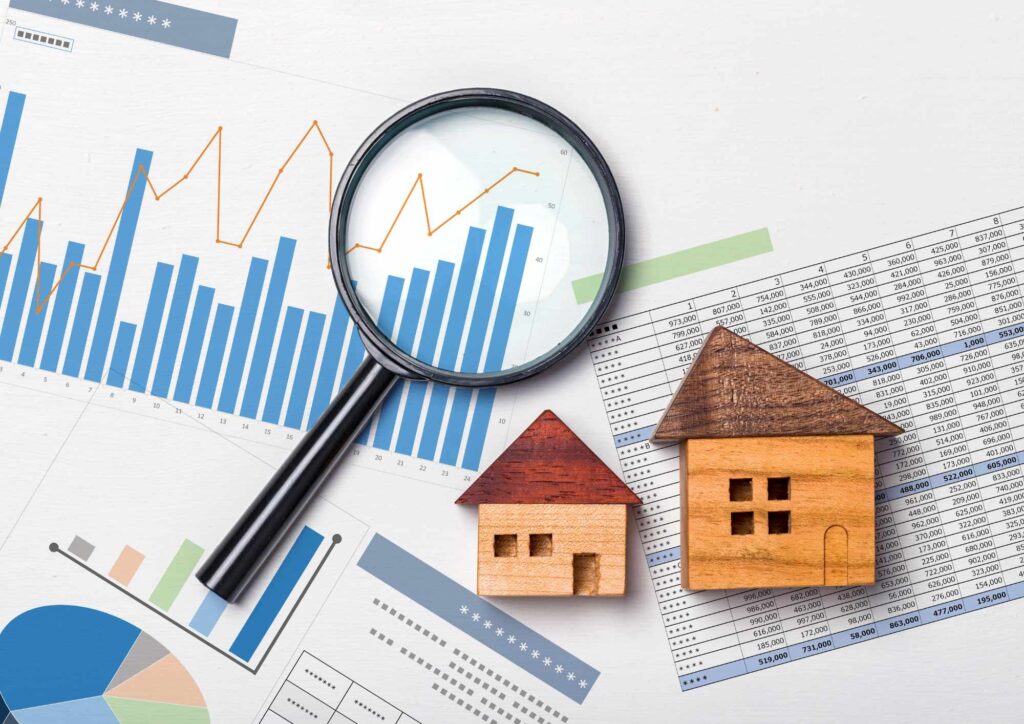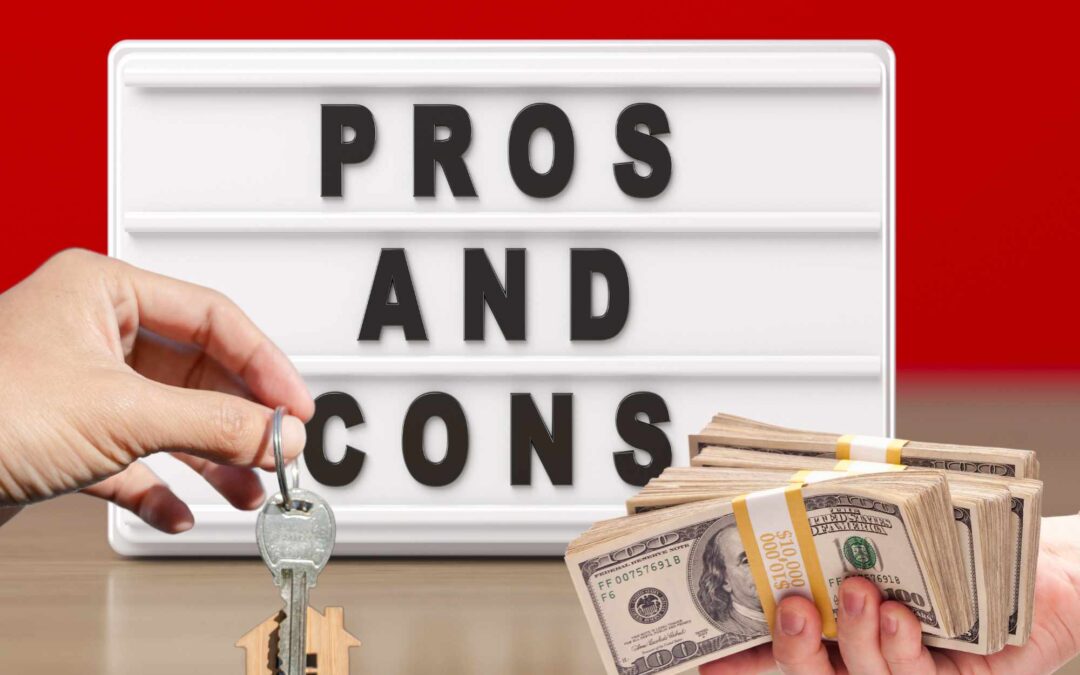Selling a house for cash may seem like an easy way out, but it is filled with many risks. From accepting lowball offers to falling into scams, these dangers can turn into costly nightmares.
This complete guide has everything you need to know in order not to make expensive mistakes while selling your house for cash. You will learn how to identify offers that undervalue your property, spot fraudulent buyers and work around having limited buyers.
By the time you are through with this reading, you will have gained knowledge on ensuring a safe transaction convenience of cash sales while safeguarding your financial welfare throughout the process.
Potential for Lower Offers Compared to Market Value
One major drawback of selling a house for cash is that the offers made could be way less than what it’s worth in terms of market value. Many times people who buy homes in cash give lower bids which begs negotiating skills based on understanding these dynamics to get a fair price.
Understanding Market Value
Before you evaluate a cash offer, it is important to know the actual market value of your home. Market value means the amount that a willing buyer will pay for your property in an open market. Several elements affect this. They include location, size and state, recent sales like those within the area among others within the vicinity, as well as current trends or demand in the marketplace.
To establish what your house is worth on the market, consider employing an expert valuer or consulting a well-informed realtor who can carry out detailed research about such matters before advising accordingly and also providing a wide range of analysis based on different scenarios so that you may be able to set reasonable expectations concerning its value.
Cash Buyer Motivations
Usually, cash buyers are likely to offer less than the price on the market. These may include:
- Profit Margins: They buy houses and aim at fixing them up or selling them off again at a higher price to make their living. Thus they need to purchase properties cheaply enough to get desired profit margins.
- Repair Costs: When making an offer, buyers often take into account potential repair works as well as upgrades needed so this can add up quickly! They will subtract these amounts from what they’re willing to pay in recognition that there’s going to be some extra expenditure.
- Speed and Convenience: One reason why people might sell their homes for cash is because it is faster and easier compared with other methods. This can be used by cash buyers as leverage to justify lower offers since most sellers would prefer a hassle-free transaction over more money.
Negotiating a Fair Cash Offer
It is important to negotiate a reasonable price for your house even if cash buyers offer less in the beginning. Here are some tips to help you with that:
- Get Multiple Offers: Look for many cash offers to create competition and bargaining power among potential buyers.
- Highlight Your Home’s Value: Bring out those features, improvements or anything about the property that makes it more valuable and justifies higher pricing.
- Provide Comparable Sales Data: Use recent sales of similar houses in your neighborhood to show market value and back up your asking price.
- Be Willing to Walk Away: If the cash buyer refuses to negotiate in good faith by making unreasonably low offers then don’t hesitate to reject them and try out other methods of selling.
Remember, a cash offer may seem attractive but it should not come at the expense of significantly undervaluing your home. You can increase your chances of securing a fair cash offer that aligns with your financial goals by understanding market value, recognizing cash buyer motivations, and negotiating effectively.

Scams and Fraudulent Cash Buyers
Sadly, fraudulent operators and scams have also found their way into the cash-for-homes industry.
These people or firms might employ forceful methods, give empty assurances or try to exploit vulnerable property owners.
Being defrauded by a scamming cash buyer can have serious financial implications. Hence, you need to be alert and take necessary measures against them.
Common Cash Buyer Scams
Among the most frequently used scams by fake cash buyers are:
- Upfront Fee Frauds: These scammers might charge you for services like home inspections or closing costs which they don’t plan on carrying out.
- Bait-and-Switch Schemes: Dishonest purchasers will initially offer a high amount of cash only to dramatically decrease it later during the process.
- False Buyer Identity: Some fraudsters could pretend to be a real estate investor or legitimate cash buyer, using phony credentials and identities to win your confidence.
- Equity Skimming: In this scam, crooks will propose buying your house and then renting it back to you before vanishing with their money without completing the purchase.
Protecting Yourself from Scams
To make sure that you are not scammed by a buyer, take these steps:
- Check if They Are Real: Always do your research and find out whether or not the person who wants to buy your house for cash is real. Go through their credentials, licenses, and online comments.
- Do Not Pay Fees in Advance: Any reputable cash buyer will never ask you to pay any fees before services are rendered or closing costs are covered.
- Have It Written Down: Ensure that every offer, agreement and term involved is well written before engaging in any transaction.
- Seek Professional Help: You might want to involve a lawyer specializing in real estate transactions or a financial adviser who can go through contracts on your behalf thereby safeguarding your rights.
- Trust Your Instincts: If something seems too good to be true or the cash buyer appears overly pushy or evasive, trust your instincts and walk away from the deal.
Being watchful all the time as well as doing extensive investigations plus seeking expert advice where necessary can help prevent falling into the hands of unscrupulous buyers while also protecting one’s financial position during the home selling process.

Limited Pool of Potential Buyers
If you decide to put your house on the market for cash, you are only targeting people who can afford to pay in full.
There might be fewer proposals and less rivalry among bidders which could potentially cause reduced selling price. Appreciating what it means when there are few potential buyers is important during such cash sales.
Factors Affecting the Buyer Pool
Many things can affect how many people might be interested in a cash purchase, for example:
- Location: In some places, there will naturally be more or less numbers of cash buyers such as investors in real estate or individuals with large amounts of money that is readily available. This is usually evident in markets where there are many old-age pensioners or holiday houses because these kinds of areas tend to attract buyers.
- Price Range: Fewer people may have sufficient financial means when it comes to dealing with high-end assets hence fewer numbers too but they can still afford mid-range ones and below. Low-cost homes frequently become targeted by persons seeking investment ventures while starter houses may also find lots of bidders who are willing to pay cash for them.
- Market Conditions: Seller’s markets usually have a lot of active cash buyers who want to close deals quickly. Conversely, buyer’s markets only appeal to picky cash buyers when prices are low.
- Property Type and Condition: Unique houses or fixer-uppers will only attract specific types of cash-paying purchasers such as investors. On the other hand, move-in ready homes in good condition can be bought by anyone looking for a place to live.
Implications of a Limited Buyer Pool
A limited range of potential purchasers can result in different consequences for selling your house. These include:
- Lower Offers: You may receive lower offers than you would in an open market with more competition with fewer buyers competing for your property. Cash buyers may have more leverage to negotiate aggressively and secure a lower price.
- Reduced Negotiating Power: A lack of multiple offers can diminish your negotiating power as cash buyers may be less inclined to negotiate aggressively. You may have to accept a less favorable offer or risk losing the buyer altogether.
- Longer Sale Timeline: Typically, with fewer people looking at your property for sale, it takes longer to find someone who matches all of your criteria perfectly such as reputation or timeline.
Mitigating the Impact
Although it may be hard to completely get rid of all the drawbacks that come with having fewer potential buyers, there are ways in which you can try to mitigate their effects:
- Make use of marketing strategies that have been proven effective at getting across the largest number of local cash buyers possible. Use the internet – especially social platforms where there is a lot of real estate investment activity. Also, tell people about your house through verbal communication.
- Another thing you could do is put up your property for sale on an open market to attract different kinds of purchasers such as those looking for traditional financing. This might bring in more offers and create competition but it takes longer than other methods.
- Make sure that you set a price that does not exceed the market range if you want to catch the attention of many cash buyers. You can even go below the average asking amount so that multiple bids are made leading to urgency on the part of prospective purchasers who would rather pay using cash.
- Provide incentives to cash buyers, such as covering closing costs or offering a home warranty, to make your property more attractive and offset the limited buyer pool.
Though selling for cash is quick and easy, it’s essential to weigh the pros and cons. Small buyer pools can lower the selling price, limit negotiation power, and impact the sale timeline.

Researching the Reputation of Cash Home Buying Companies
If you decide to pursue a cash sale, it’s essential to thoroughly research the reputation and track record of any cash home-buying company you consider working with. A reputable company should be transparent about their processes, fees, and timelines, and should be willing to provide references and allow you to thoroughly review any contracts or agreements before signing.
Why Reputation Matters
Working with a disreputable or untrustworthy cash home-buying company can lead to these potential issues:
- It might leave you financially vulnerable if they don’t follow through with their commitments. They could use illegal methods such as hidden charges or bait and switch which will result in a lot of money down the drain.
- It might expose you to legal liabilities because unlicensed firms seldom abide by local laws and regulations. The lack of proper documents or contracts can also lead to legal battles and other complications.
- It can cause a lot of emotional stress for you since dealing with such fraudulent enterprises is emotionally draining. This happens when they fail to keep their word or give false information which makes people lose trust easily.
- You may end up wasting time by working with them since disreputable companies always cause delays thus dragging out the selling process unnecessarily.
Researching Company Reputation
Whenever you’re dealing with money, it’s important to find trustworthy people who won’t take advantage of your situation.
These are some steps that will help you find a reliable cash home buying company:
- Go through online review systems such as Google Reviews or Yelp and check what other customers have said about their experiences with this particular company. Positive or negative recurring themes in reviews can tell you a lot about an organization.
- Determine whether they belong to any associations within their industry or hold certifications relevant to their work. Being a member of organizations such as the National Association of Real Estate Investors (NAREI) and/or National Association of Home Buyers(NAHB) indicates dedication and is always positive.
- Ensure that it has all the licenses required for operating under the law in which it operates. This can be confirmed by calling the state real estate commission or consumer protection agency, which may also keep records about any complaints lodged against these firms as well as disciplinary measures taken against them.
- Ask about their previous clients to know what it’s like working with different companies. Legitimate establishments will have records of successful deals they’ve done before.
- Another thing is you should find out about the financial background and track record of these organizations or else you’ll get stranded somewhere along the line when they run out of money. Ask for them if need be but also look for any signs such as bankruptcy filings among others which indicate a lack of financial stability on their side.
- During the initial stages, observe how they interact with you as this could indicate whether they are genuine or not. A reputable business will always be open, transparent and ready to answer any queries one may pose at that time.
Keep in mind that spending a few minutes researching potential cash buyers for homes can save many hours and dollars during the sale, not to mention keep things going smoothly.

Consultation with a Financial Advisor
When you sell your home, it is an important financial transaction for you. Many times, a good idea would be to look for a professional financial advisor’s advice.
Benefits of Consulting a Financial Advisor
Here are the benefits to working with a financial advisor when you sell your home for cash.
- A financial advisor can provide an independent opinion about any cash offers you receive, helping you decide whether they serve your best interests. They can give you advice and suggestions that are not influenced by personal feelings or outside factors.
- Selling a house may attract substantial tax implications especially if the duration of ownership is long or there is significant equity involved. A financial advisor will enable you to comprehend the tax effects and come up with strategies that can help in reducing your liability.
- If you plan to reinvest the proceeds from the sale, a financial advisor can help you develop an investment strategy that aligns with your risk tolerance and long-term goals. They can guide diversifying your portfolio and identifying suitable investment opportunities.
- A financial advisor can help you determine how the sale of your home fits into your overall retirement plan for those nearing retirement or already retired. They can assist in adjusting your retirement income strategy and ensuring that your financial needs are met.
- If you have outstanding debts or mortgages, a financial advisor can help you develop a plan to pay off or consolidate those debts using the proceeds from the sale. This can improve your overall financial health and reduce unnecessary interest expenses.
Finding a Reputable Financial Advisor
When seeking a financial advisor, it’s essential to find a reputable and experienced professional who specializes in the areas relevant to your needs.
Consider the following factors:
- Credentials and Qualifications: Seek advisors who have recognized designations such as Certified Financial Planner (CFP) or Chartered Financial Analyst (CFA), as these demonstrate high levels of education, experience and ethical standards.
- Fiduciary Duty: Make sure that they operate under fiduciary duty which legally obliges them to act in your best interests and this can help prevent conflicts of interest and promote transparent advice.
- Specialization: Take into account those specializing in real estate transactions, tax planning and investment management since their expertise could offer valuable insights and strategies customized for your situation.
- Fee Structure: Understand their fee structure ensuring it is clear as well as meets your expectations. Hourly rates, flat fees or percentages based on assets under management are among the common forms of charging fees by advisors.
- Referrals and Reviews: Request referrals from people you trust like friends, family or other professionals whom you already work with. Also, read online reviews about them plus check disciplinary history with relevant bodies overseeing such services.
By engaging an established financial adviser, one can get useful tips and limit the risks involved while making decisions about selling homes for cash.

Making the Right Choice
Though it can be risky, selling your home for cash is also fast and easy. Be aware of the possibility of receiving an offer that is too low or falling prey to scams and having few buyers to choose from. You should investigate cash home-buying companies very thoroughly before making any deals with them; you may even want to consult a financial adviser.
There are many ways in which this could work out as long as certain precautions are taken. But don’t make up your mind too quickly because doing so might jeopardize your financial situation.
Examine every option open to you and select one that most closely matches what you hope to achieve given your specific circumstances. If you prepare well then things will turn out fine.
The Easy Path to Selling Your Columbia Home for Cash
Are you eager to sell your home quickly and easily? We Buy Houses Columbia offers a straightforward cash sale process that saves you time and stress. Here’s how to get started:
- Contact We Buy Houses Columbia for a fast cash offer.
- Skip the hassle of repairs and showings with a simple transaction.
- Get your cash in hand within weeks.
Why Cash Sales Are Gaining Popularity in Columbia
Columbia, SC, is a vibrant city known for its rich history and beautiful landscapes. Homeowners in Columbia are increasingly discovering the benefits of selling their properties for cash. With a supportive community and trusted cash buyers, selling your home has never been easier.
From its thriving neighborhoods to its cultural attractions, Columbia provides an excellent environment for homeowners looking to make a quick sale. Whether you’re relocating, downsizing, or facing unexpected changes, opting for a cash sale allows you to bypass traditional hurdles and focus on what truly matters.


Recent Comments